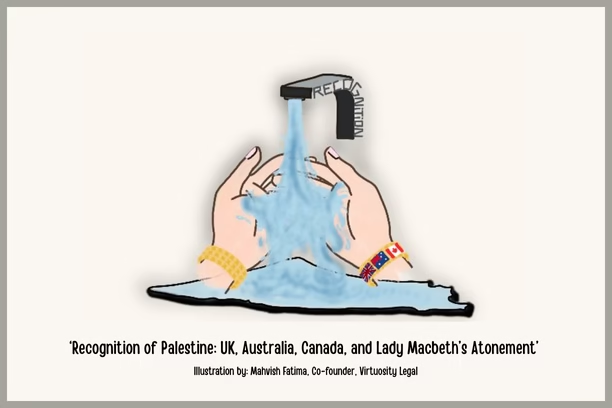The author is indebted to Ghufran Ahmad, Research Correspondent, Virtuosity Legal and Mahvish Fatima, Co-founder, Virtuosity Legal for their inputs.
“DOCTOR:
What is it she does now? Look, how she rubs her hands.
GENTLEWOMAN:
It is an accustomed action with her to seem thus washing her hands.
I have known her continue in this a quarter of an hour.
LADY MACBETH:
Yet here’s a spot.
DOCTOR:
Hark, she speaks. I will set down what comes from her,
to satisfy my remembrance the more strongly.
LADY MACBETH:
Out, damned spot! Out, I say!”
Lady Macbeth in Act V, Scene 1 of the play Macbeth is seen continuously washing her hands as she contemplates what she had helped Macbeth do. The Doctor in the scene suggests that the Lady needs spiritual rather than medical aid. The ‘phenomenon’ was later recognised as the Lady Macbeth Effect, where a person experiences a deep, almost compulsive need to cleanse themselves, both physically and emotionally, after feeling guilt or shame. The UK, Australia, and Canada, arguably devout allies of Israel, announced ‘recognition’ of the state of Palestine on Sunday in separate but coordinated statements. France and multiple other countries are expected to follow suit. This comes years after each one of these have in some or the other way aided the IDF in what Amnesty International calls a genocide. For the ease of the reader, all these states have been henceforth referred to as Lady Macbeth States.

Recognition under International Law
Recognition in International Law is more than ‘mere acknowledgement’. Morton A. Kaplan Nicholas and Deb. Katzenbach in their book The Political Foundations of International Law[i], have dealt with the subject of recognition exhaustively, as a formal governmental act that attaches a set of ‘customary legal consequences’ to certain facts ‘deemed sufficient for statehood or governmental legitimacy’. There are two primary theories of recognition: the constitutive theory, which holds that recognition confers statehood, and the declaratory theory, which sees recognition as the acknowledgement of a pre-existing factual condition. Regardless of theory, the act of recognition is never simply symbolic; it is a decision imbued with adjudicative facets, justifications, and political discretion, often in the context of conflicting claims.[ii] Therefore, the Lady Macbeth states will have to (at least, in rhetorics) extend to the ‘Palestinian state’ these rights.
Recognition, by its nature, is a collective acknowledgment by participants in the international system that a new entity is entitled to the rights and privileges of a state or government, insulating it from foreign control and serving as a focal point for ongoing responsibility under both international and domestic law. Once recognition is extended, the new entity receives a whole bundle of customary rights—the most important being the consolidation of its independence against adverse claimants. The process goes further: recognition of a government brings stability and prestige, access to state funds, the ability to contract loans, establish diplomatic relations, and request assistance. Absent recognition, these rights are suspended or accorded to another claimant, serving as a way for third states to exert pressure or maintain the status quo.[iii]
Guilt of the White Man?
Mathematically speaking, there are two points on the circle of discourse at present. Point A is Israel’s “right to defend itself” (and attack everyone else), and Point B is the recognition of Palestine as a state (seemingly sovereign). The Lady Macbeth states have begun their circles at these two points and are now merely chasing their own tail.
For the presence of a Palestinian state is evident even during Israel’s formative years, for instance, the NY times in 1948 reported: “Accordingly, the members of the National Council, representing the Jewish people in Palestine and the Zionist movement of the world, met together in solemn assembly by virtue of the natural and historic right of Jewish people and of the resolution of the General Assembly of the United Nations, hereby proclaim the establishment of the Jewish state in Palestine, to be called Israel”[iv] Shortly thereafter, the US Government issued a press release, “This Government has been informed that a Jewish state has been proclaimed in Palestine, and recognition has been requested by the provisional government thereof. The United States recognises the provisional government as the de facto authority of the new state of Israel”[v] Therefore, whether or not Israel had the ‘right to exist’, it existed, and it did so on existing Palestinian Territories.
James Baldwin in his essay ‘Guilt of the White Man’, wrote on how the ‘white’ liberal in America seeks to ‘do good’ without dismantling the system that made him powerful, the Lady Macbeth states offer symbolic legitimacy to Palestine not to empower it, but to cleanse themselves of the ‘complicity’. It is certain that no ‘action’ would come out of this act, it is merely one where the society seeks to move past its guilt and reforge its moral narrative to silence the persistent ghost of unatoned wrongdoing.
‘Myth-making’ as a tool for re-writing history
Will Durant once wrote, “Most of History is prejudiced and the rest is guessed”. Unfortunately, the Palestine Issue has been a mix of both, it can be said to have been ‘prejudicially guessed’. Mythmaking has been effectively used as a tool. The sudden recognition of ‘Palestine’ appears to be a deliberate attempt to impose an amnesia. Lady Macbeth states want the world at large to ‘forget’ their complicity now that the pariah state is losing in the court of public opinion.
The global discourse on the Palestine issue has shuttled between countries asserting Israel’s ‘right to exist’ as a state and Palestine’s ‘recognition as a state’. It is humbly submitted that this very language exposes the double standard: one state is presumed to possess an inherent right to existence, while the other’s legitimacy is left contingent upon the political convenience of powerful nations. The recognition of one of these is trivial and arbitrable, while other is an irrefutable truth.
[i] Kaplan MA and Katzenbach N de B, The Political Foundations of International Law (Wiley 1967)
[ii] Ibid
[iii] Ibid
[iv] The New York Times, May 15 1948, p.2
[v] 18 Department of State Bulletin 673 (May 23, 1948)


Leave a Reply